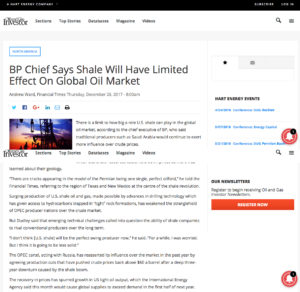 OEF REVIEW:Question: BP moved very quickly to say it thought that the oil price would stay low for a long time. What factors fed into that statement? Answer: If you consider the two most recent big drops – 2008/2009 and 1998 – both of those were driven by economic recessions. So, we saw big falls in demand. Those tend to correct themselves relatively quickly. In contrast, the price weakness this time was caused by strong growth in supply, initially as a result of very strong growth in US shale. Normally, world demand for oil grows by about 0.8 million barrels a day per year, but at the end of last year US shale, on its own, grew by 1.6 million barrels a day. Last year, we saw a combination of supply increments from Iraq and Saudi Arabia that added a further 1.5 million barrels a day. What we know from history is that the oil market takes an awful lot longer to adjust to supply shocks than it does to cyclical demand shocks.
OEF REVIEW:Question: BP moved very quickly to say it thought that the oil price would stay low for a long time. What factors fed into that statement? Answer: If you consider the two most recent big drops – 2008/2009 and 1998 – both of those were driven by economic recessions. So, we saw big falls in demand. Those tend to correct themselves relatively quickly. In contrast, the price weakness this time was caused by strong growth in supply, initially as a result of very strong growth in US shale. Normally, world demand for oil grows by about 0.8 million barrels a day per year, but at the end of last year US shale, on its own, grew by 1.6 million barrels a day. Last year, we saw a combination of supply increments from Iraq and Saudi Arabia that added a further 1.5 million barrels a day. What we know from history is that the oil market takes an awful lot longer to adjust to supply shocks than it does to cyclical demand shocks.
 Bob Dudley, chief executive of BP, has said that there is a limit to how big a role U.S. shale can play in the global oil market, adding that traditional producers such as Saudi Arabia would continue to exert more influence over crude prices.
Bob Dudley, chief executive of BP, has said that there is a limit to how big a role U.S. shale can play in the global oil market, adding that traditional producers such as Saudi Arabia would continue to exert more influence over crude prices. 
